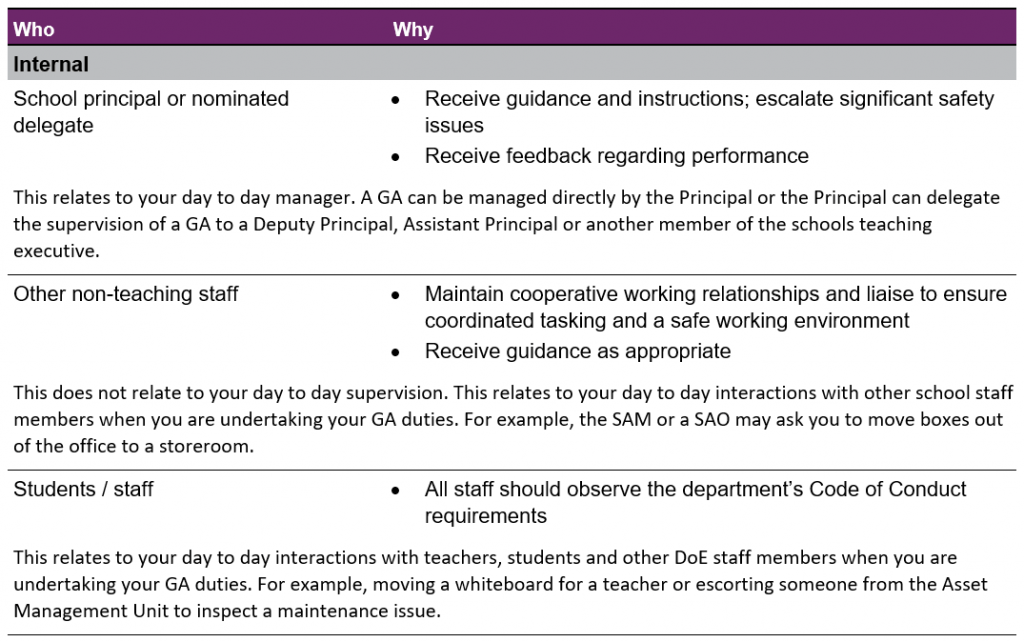General Assistants role description – PSA quick reference guide
General Assistants role description – PSA quick reference guide (pdf version)
Since the election of the O’Farrell Government, employment in the NSW public service has gone through some substantial changes. The Public Sector Employment Management Act has been replaced by the Government Sector Employment (GSE) Act. This change occurred in 2013.
General Assistants (GAs) and other staff are now covered by the GSE and one of the major changes is that you are now ‘assigned a role’ rather than being ‘employed in a position’. The GSE has seriously undermined public servants’ conditions particularly in respect of job security.
The GSE allows the Secretary of the Department of Education (DoE) to reassign staff across the agency. This means a GA can be directed to work in different schools with little or no consultation.
Another aspect of the GSE changes is that GAs now work under a Role Description and the Statement of Duties will no longer apply. The DoE and the PSA have had a lengthy consultation about the new role description for GAs. What the DoE intends to implement has undergone some substantial modifications from the original draft version as a result of the PSA’s intervention.
Your Delegates on the General Assistants Advisory Group (GAAG) have assisted the union to ensure the best outcome for GAs to retain as many elements of the Statement of Duties as possible. Eighteen changes were sought by the union and the DoE agreed to 11 amendments.
Below is an explanation and clarification of the GA Role Description. A copy of the Role is attached.
The elements of the Role Description
Agency overview
The DoE describes itself and what programs it delivers to the community.
Primary purpose of the role
This provides an overview of the job. Members should notice that the provision around the time allocation for a GA has been retained. This means that a GA whose time allocation is two days can’t be expected to do five days’ work.
Key accountabilities
This area provides the main functions of the GA role. You will notice that there is a greater emphasis on work health and safety as the DoE shares the union’s commitment to a safe workplace. Some of the key accountabilities will look very familiar as the union has sought to keep this document as simple and clear as the old statement of duties. Below is a brief explanation of the Key Accountabilities:
Organising rooms, furniture, audio visual aids, public address systems, lockers and other items/equipment for school activities as required; dismantle and store items when not in use (with assistance where required). (NB. the role is not responsible for operating audio visual equipment or public address systems)
This is similar to the old statements of duties. You will notice that there is now the aspect of work health and safety (WHS) that must be considered when you are asked to undertake your duties. If the task needs two people to be performed safely you should ask your supervisor to arrange for help.
- Identify and report maintenance / safety issues to the role supervisor; undertake minor maintenance of buildings and equipment not covered by contracts or requiring a qualified tradesperson
This key accountability combines several elements from the old statement of duties. This includes reporting requirements and minor maintenance such as repairing a hole in a wall, painting a door or erecting a notice board. Minor maintenance does not include building a wall, painting the library/class rooms or installing smart boards or air conditioners.
Tasks that are under contract or require a qualified trades person should not be performed by a GA. This has always been the case.
- Maintaining and caring for school grounds, including: mowing school lawns and playing fields; marking of school playing fields; preparation of ground for planting trees and shrubs and planting and watering of same; pruning shrubs, trimming hedges, light lopping and trimming of trees. Safely and proficiently operate mowers, tools and equipment; store and maintain mowers, tools and equipment in accordance with WHS standards.
This is a repackaging of item 10 of the old statement of duties. Again, a focus on WHS standards has been introduced. Your supervisor must take WHS into consideration when assigning your tasks.
The union encourages members to be fully aware of the DoE’s Safe Operating Procedures, Safe Work Practices and Safety Alerts. If you do not have access to these documents, you should request them from your supervisor.
- Unpack, store and/or distribute supplies in accordance with school procedures and safe work standards (e.g. chemical storage and handling); assist with school stocktakes as required
This is a repackaging of items two and three from the old statement of duties. Again, a focus on WHS standards has been incorporated into this key accountability. A GA is not a store-person and packer. A GA can unpack, store and deliver supplies only after the order has been verified as being correct.
While procedures may differ from school to school, the union believes that the best person to verify the order is correct is the staff member who placed the order. How else can a school know it has have received what they paid for?
- Monitoring school security systems and reporting faults to the Principal or School Teaching Executive.
This is retained from the old statement of duties except when you identify a fault you now report it to the Principal or someone from the school teaching executive.
- Other related duties of the role, within the capabilities of the General Assistant, as directed by the Principal or School Teaching Executive.
This is retained from the old statement of duties except the Principal can delegate the supervision of a GA to a member of the school teaching executive. This has always been the case. However, now it has been formalised in the role description.
Other related duties of the role do not mean that you can be tasked to do anything and everything in a school. The other duties must be directly linked to the other key accountabilities.
Key challenges
- Working cooperatively with the role supervisor to prioritise upcoming tasks
A GA works with their supervisor to plan and prioritise upcoming tasks. A GA is consulted with but not does develop school work plans or maintenance schedule.
- Responding flexibly to competing/emerging minor maintenance priorities
A school is a very busy workplace where unexpected issues and emergencies occur without planning. A GA is consulted with but is not responsible for dealing with unexpected issues and emergencies. For example, a GA should not be expected to check rooms for students during a school lock down or evacuation.
- Maintaining cooperative relationships with teaching and non-teaching staff.
This element aims to foster harmony in the workplace. This is also a requirement of the Code of Conduct.

Role dimensions
Decision making
Traditionally a GA has worked with minimal supervision. This is still sometimes the case depending on your school. The GA exercises discretion on completing tasks that they are competent to undertake. If the job requires a qualified tradesperson or is under contract, the GA does not perform this task.
In exercising their discretion, a GA will factor in a number of elements to the job such as the process involved and work health and safety. If a GA is asked to mow the oval but the oval is in use by students, the GA will use discretion to mow at another time when students aren’t present.
Reporting line
A GA reports either directly to the school Principal, or if the Principal wishes, another member of the school teaching executive. GAs do not report to SAMs as a SAM only manage SAOs as specified in their statement of duties.
Direct reports
A GA has no supervisory role. This includes supervising contractors. A GA can be asked to escort a contractor to the site of the job and that is the limit of their responsibility.
Budget/Expenditure
A GA does not have any budget management responsibilities. All purchases should be approved by following the school’s purchasing procedures and procurement policy.
Essential requirements
For some time now, GAs along with other school staff and volunteers have been required to have a valid working with children check (WWCC) clearance. The WWCC clearance lasts for five years. Make sure you allow plenty of time to renew your WWCC clearance as the DoE will terminate staff who have allowed their WWCC to lapse.
Capabilities for the role
Under the GSE all public sector employees’ roles have a number of capabilities identified that the employee must fulfil. Each capability has five levels of skills, knowledge and abilities in that area. These levels start at Foundational and progress through Intermediate, Adept, Advanced and Highly Advanced. See attached Role Description.
If you want more in depth knowledge of the capability framework visit: www.psc.nsw.gov.au/capabilityframework
The NSW Public Sector Capability Framework for GAs follows. The bold capability names and levels are a GAs focus capability.
The DoE has determined that GAs are only required to have foundational capability levels to successfully undertake their role in a school. A foundational capability level is base level in respect of Manage Self, Communicate Effectively, Deliver Results and Demonstrate Accountability. These are known as the focus capabilities for a GA.
The PSA does not agree that the Capability Groups and the Capability Names are truly appropriate for a GAs role. For example, the PSA does not believe that the Business Enablers capability group has any relevance to the GA role.
A GA does not have any financial delegation so the Finance capability seems odd even though a GA should know the schools purchasing procedure. Similarly, the technology capability seems strange when some GAs are denied access to computers and training. Procurement and contract management, along with Project Management has never been the responsibility of a GA.


These are examples of what the Government sees as the minimum requirement for GAs to undertake their role.
The PSA does not believe the Role Description should be used to add new jobs or increase the workload of a GA beyond their time allocation and training.
Do you know a non-teaching staff person who is not a PSA member? They can join HERE













